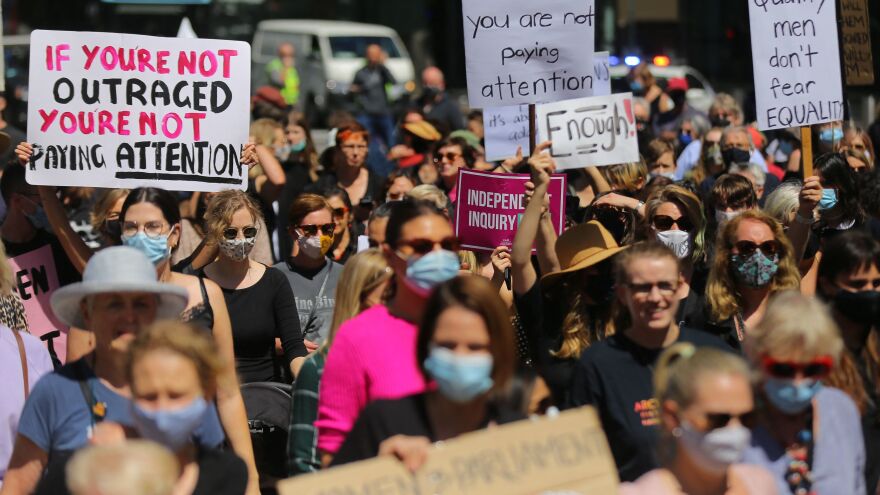Australia's #MeToo movement is set to face one of its first real legal tests since erupting in spring 2021.
The trial of parliamentary staffer Brittany Higgins' alleged rapist, which began on Tuesday and could last up to six weeks, may become one of the country's most-watched court cases in decades. Current and former political figures are likely to testify as witnesses.
What they say, and how the jury reacts, could roil a nation that's reforming gender inequality from the top down.
Higgins says she was raped inside Parliament House
Higgins, who served as an aide for Australia's Liberal Party, alleges she was raped in 2019 by Bruce Lehrmann, a fellow staffer at the time.
During a 2021 police interview played during Tuesday's opening arguments, Higgins told police that she and Lehrmann agreed to split a cab home following a night of heavy drinking, but he asked to take a detour to the federal parliament building.
"It didn't seem inconceivable to go to Parliament," she said in the interview. "It felt like a safe space for me."
Higgins, then 24, says she fell asleep on a couch in a minister's office, awoke to a sharp pain and realized that Lehrmann was having sex with her.
"I said no at least half a dozen times," Higgins told police. "He did not stop, he kept going."
Higgins said that an unspoken "don't ask; don't tell" policy throughout Parliament House discouraged her from making a formal report internally, though she did tell her boss, then-Defense Minister Linda Reynolds, and a dozen others about the attack.
Lehrmann, 27, has repeatedly denied the allegations. He pleaded not guilty to one count of sexual intercourse without consent, which carries a maximum penalty of 12 years in prison.
Politics fueled Australia's #MeToo movement
Lehrmann's lawyers argued in their opening statement that the tremendous public and media attention on the case cast unfair doubt on the defendant.
Higgins' allegations, which she shared with media in early 2021, inspired a wave of women in Canberra to come forward with stories of mistreatment. According to a government survey that followed, more than 1 in 3 women working in parliament had experienced sexual harassment.
Across the country, thousands more women took to the streets to protest misogyny, which they say is embedded in everything from coal mines to corporate halls of power.

Michelle Arrow, who studies politics and gender at Macquarie University, described Higgins' allegations as the "ignition point to a wider conversation."
"The appalling nature of the case and what Higgins says she experienced was important in its own right," Arrow told NPR. "But the fact that she says it happened in Parliament House — a place where powerful people work and decisions are made ... concentrated the conversation around women's access to power."
The national reckoning proved consequential in the country's federal election last spring, which saw the ruling conservative coalition ousted largely by independent female candidates and women voters.
The trial and its attendant media attention may also test reform appetite when it comes to the Australian judicial system. Critics say strict secrecy and defamation laws, which keep most of the country's sexual assault trials out of the public eye, were designed to protect defendants.
Media commentary has already led to one delay in the start of the trial.
Ahead of opening arguments this week, the judge urged jurors to tune out all coverage and "search their souls about whether they can be impartial," recusing themselves if necessary.
Copyright 2022 NPR. To see more, visit https://www.npr.org.



